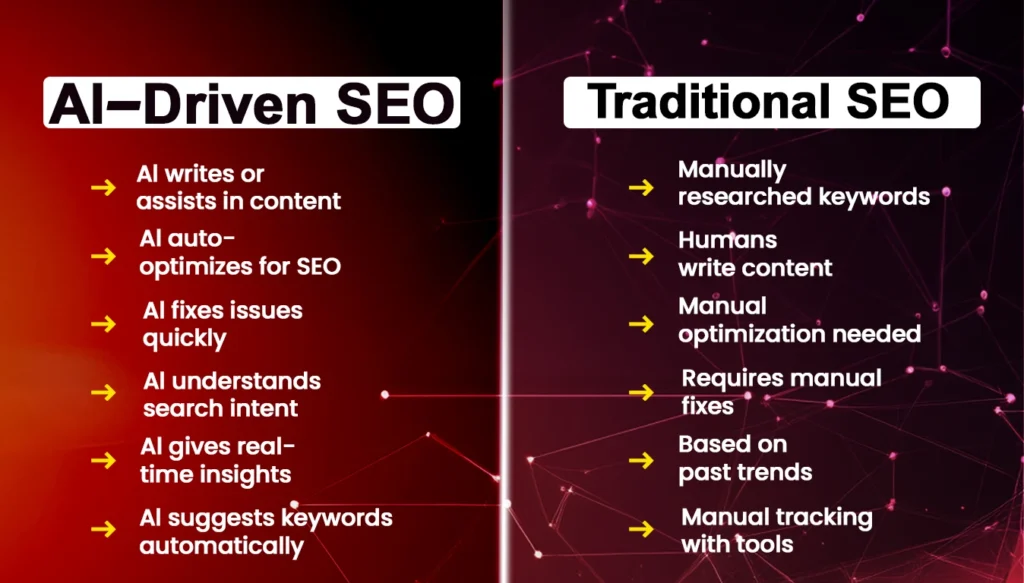In today’s fast-paced digital world, SEO (Search Engine Optimization) is undergoing a transformation. With 71% of consumers worldwide now preferring voice search over traditional typing and AI-driven search algorithms set to influence over 50% of searches by 2025 (Source: PwC), businesses everywhere—including in Bangladesh—need to adapt. But does traditional SEO still work in this new digital age?
The Short Answer: Yes, but it’s evolving rapidly. Let’s explore how AI and voice search are changing the SEO landscape and how businesses—both local and global—can stay ahead of the curve.

How AI is Reshaping SEO
AI technologies like Google’s RankBrain, BERT, and MUM are changing how search engines rank content. These AI systems now focus on user intent rather than just keywords. This means that outdated tactics like keyword stuffing no longer work. Google now evaluates how well content answers user queries by considering factors like relevance, context, and engagement.
Key AI-Driven SEO Trends You Should Know:
- Understanding Natural Language: AI is getting better at understanding natural, conversational language. So, it’s important to focus on content that answers real customer questions, not just keywords.
- AI-Powered Content Creation: Tools like ChatGPT and Jasper are helping businesses create high-quality content that aligns with both SEO best practices and user intent.
- Predictive Search and Personalization: Google’s MUM model predicts what users will search for next, giving them highly personalized search results. This can help businesses target the right customers with the right content.
- Automated SEO Tools: AI tools like Surfer SEO and Clearscope analyze the top-ranking pages and provide data-driven recommendations to help optimize your content.
How Local and International Businesses Can Leverage AI-Driven SEO
Local brands like Daraz Bangladesh and Pathao can benefit from optimizing content based on user intent, not just keywords. For example, Daraz can tailor its SEO strategy by focusing on specific customer intent such as “Where can I buy affordable smartphones in Dhaka?” rather than just targeting broad terms like “smartphones.”
Global brands like Amazon use AI and machine learning to provide personalized product recommendations based on user behavior. Their SEO strategy isn’t just about keywords; it’s about anticipating what customers will want next. For instance, if you’ve been searching for running shoes, Amazon’s algorithms will show you related products like fitness trackers or sports apparel, improving user experience and boosting sales.
Actionable Tips for Local and Global Businesses:
- Create informative content that answers customer queries directly.
- Use AI tools like Surfer SEO or Clearscope to analyze what’s working for top-ranking pages.
- Optimize content for conversational language that answers real user questions, making your content more relevant.

Voice Search and Its Impact on SEO Locally and Globally
With voice assistants like Google Assistant, Siri, and Alexa, more people in Bangladesh and around the world are conducting voice searches on their smartphones. Instead of typing “best coffee shop Dhaka,” users now ask questions like “Where’s the best coffee shop near me?”
Voice Search Changes to Note Locally and Globally:
- Long-Tail Keywords: Voice searches are often longer and more conversational, meaning long-tail keywords are more important than ever.
- Local SEO: Over 58% of consumers use voice search to find local businesses (Source: BrightLocal). This is especially relevant in cities like Dhaka, Chittagong, and Sylhet, where people frequently search for local services on their smartphones. Similarly, global businesses like Starbucks have optimized their voice search queries to make it easier for users to find nearby stores.
- Featured Snippets: Voice assistants often read out the top result in search, so ranking for featured snippets has never been more important.

Voice Search Optimization for Local and Global Businesses
- Use Conversational Keywords: Instead of targeting rigid phrases, focus on how people naturally speak. For example, “best local restaurant in Dhaka” can be optimized for voice search queries like “What are the best local restaurants near me in Dhaka?”
- Focus on Local SEO: Update your Google My Business profile to ensure your business appears when users ask location-based questions.
- Structure Content for Featured Snippets: Answer common customer questions clearly and concisely. This will help you secure that top spot in search results, where voice assistants pull answers from.
- Ensure Mobile-Friendliness: Since voice searches mostly happen on mobile, ensure your website is mobile-friendly and fast.
In Local Business: A dental clinic in Dhaka optimized its website for phrases like “Where can I find an emergency dentist in Dhaka?” After this change, the clinic started appearing in Google’s featured snippets, driving 35% more traffic.
In International Business: Domino’s Pizza has optimized its voice search strategy so that users can easily find the nearest location through voice assistants. When a customer asks “Where’s the nearest Domino’s?” the response includes the closest location, which drives more foot traffic and sales. This personalized approach boosts both customer satisfaction and local sales.

How SEO Impacts Business Revenue Locally and Globally
SEO doesn’t just help you rank higher on Google; it directly impacts your revenue. According to BrightEdge, 53% of website traffic comes from organic search, making it the largest source of traffic and revenue for most businesses.
In Local Business: A Bangladeshi e-commerce brand that implemented AI-driven SEO strategies saw a 35% increase in organic traffic and a 25% increase in sales within just six months.
In International Business: Booking.com relies heavily on SEO to generate billions of dollars in revenue. By optimizing their content for global and local searches, they capture a massive amount of organic traffic, with millions of bookings directly resulting from search engine visibility. Their consistent SEO strategy makes them a leader in the competitive travel industry.
Why is this Important for Your Business?
- Higher Conversion Rates: Businesses investing in SEO see a 14.6% conversion rate on average, much higher than the 1.7% conversion rate from traditional outbound marketing.
- Cost-Effective: SEO is a cost-effective way to drive sustainable traffic to your website, compared to paid ads.

What Business Owners Locally and Globally Can Do Today:
✅ Create Quality Content: Focus on content that answers real questions your customers are asking. For example, write blogs or FAQs based on local search trends like “Best restaurants in Dhaka” or “Where to find affordable clothing in Sylhet?”
✅ Embrace AI Tools: Use AI-powered SEO tools like Surfer SEO or Clearscope to analyze your competitors and improve your rankings.
✅ Optimize for Voice Search: Don’t just focus on written keywords. Adapt your content to voice search queries, and ensure your website is mobile-friendly.
✅ Stay Local: Optimize for local search and make sure your Google My Business profile is fully updated.
Is Your SEO Strategy Ready for AI & Voice Search Locally and Globally?
SEO isn’t dead—it’s evolving. AI and voice search are reshaping the way search engines rank content, and businesses that adapt will thrive. By focusing on user intent, using AI-powered tools, and optimizing for voice search, you can stay ahead in this AI-driven digital landscape.
Businesses like Daraz Bangladesh, Pathao, Amazon, Domino’s Pizza, and Booking.com are already reaping the benefits of these SEO advancements. The real question isn’t whether SEO works; it’s whether your business is ready to evolve with it.
🚀 Start optimizing today with AI-powered tools like Surfer SEO or Clearscope to future-proof your search rankings and stay competitive in both the Bangladeshi and global markets!










